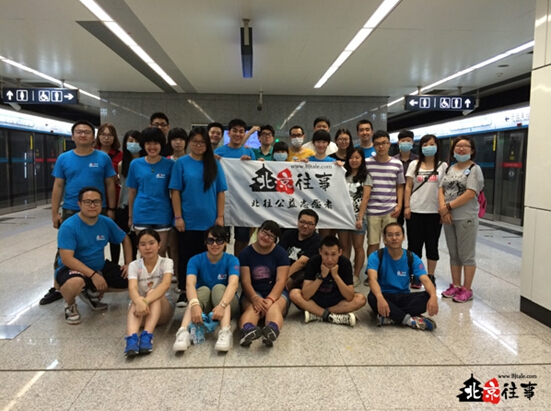Over 1,000 volunteers help clean up Beijing subway flyers
china.org.cn / chinagate.cn by Wei Jia, May 20, 2015 Adjust font size:
|
|
| BYAIAP volunteers pose for a photo before one of their subway clean-ups. (Photo credit: Beijing Tale) |
For subway commuters in Beijing, young people picking up flyers in the carriages and putting them in black plastic bags are not a strange sight. Since May 2013, the media has widely reported on the efforts of Beijing Youth Against Illegal Advertisement Posters (BYAIAP), a volunteering initiative to clean up posters and flyers on lampposts, on walls in public spaces and ultimately in Beijing's subway trains.
Flyers in Beijing's subway is no trifling issue: Sometimes there are so many of them that the floor of certain lines' subway trains can be literally carpeted. To fight this scourge, fifty to sixty people, most of whom were born in the '80s, board the subway in Beijing armed with masks, gloves and black plastic bags at least once a week. People wanting to join this public welfare campaign can apply on the website of Beijing Tale, the non-profit organization which arranges BYAIAP cleanups. Founded in 2012, Beijing Tale also takes on public welfare duties such as tree planting and offering emotional support to families grieving the loss of their only children.
But it's BYAIAP that has brought Beijing Tale the most publicity. BYAIAP volunteers come from all walks of life, but they all share a commitment to making Beijing, which is home for most BYAIAP volunteers, a tidier place.
Those who distribute flyers in the subway naturally find these volunteers irritating, so much so that they have sometimes threatened the volunteers, telling them to mind their own business.
It's with this risk in mind that Teng Fei, a Beijinger born in the '80s and one of the founders of Beijing Tale, made a point of having his volunteers work in groups to ensure safety. Teng's precaution is not one taken out of paranoia.
In April 2013, a sanitation worker in Beijing was beaten up by three thugs when he was trying to clean up the illegal advertisements they posted. The incident filled Teng with indignation. "They dare to gang up on one sanitation worker, but do they dare to pick a fight with a group of people?" Teng and other members of Beijing Tale, less than 10 people in total, sprang into action, starting Beijing Tale's fight against illegal advertisement posters half a month later.
BYAIAP has come a long way since then, but as many of its volunteers are well aware, their effort is not enough to stamp out illegal advertisement posters and flyers in Beijing. Still, they hope their persistent attempts to achieve this goal can inspire more people to do the same.
The anger at the brazenness of some advertisement-posting hooligans that Teng and like-minded people felt more than two years ago has not blown over or been channeled into useless complaints. Instead, it has turned into something positive, motivating Teng and his fellow volunteers to take action to redress an issue they feel strongly about. And carriage by carriage, Beijing Tale, which now has more than 1,000 registered members, is writing its own story, one that we would all do well to remember when things we don't like make our blood boil.
